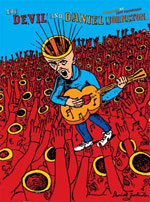
It's amazing how much footage there is of Daniel's early days of obscurity, and then his strictly local celebrity in Austin, Texas. He seems to have been just as interested in filming his surroundings as he was in taping them: as a companion piece to his mother Mabel's (provoked, concerned, vicious, God-fearing) rants which can be found liberally strewn around his earliest tapes ('People say Dan Johnston's crazy - I don't want my son to be a laughing stock', and on and on), we get to see a film he made with his brother as a teenager, in which he actually plays his mother, yelling and serving up a gross meal of 'green Kool Aid and popcorn, I think it was' commentates Mabel in slight disbelief. 'He's doing it for the humour'. She doesn't come out of the film at all badly: of the recordings in which she unwittingly featured, all she'll say is 'I didn't like it when he did that'. There's no doubt that Daniel was a layabout by any normal standards (though he could knock out a classic album a month at his early 80s peak), only ever managing to hold down a job at McDonalds. His mother berates him for being 'unprofitable' - as good Christians, she and husband Bill 'contribute 10%' (to charity), but whenever Dan does have any money he 'spends it on a bunch of rubbish' (we get to see the rubbish in various incarnations - rooms full of drawings and comics, always with a piano). Of the time he ran away with the carnival, she says it was the worst time of her life. She's a normal mother; what did she do to deserve Daniel?
Bill seems pretty normal too, and it's impossible not to feel for him when he tells the story of the small plane he was flying that Daniel took out of his control (he thought he was Casper the Friendly Ghost, and that it'd be neat to parachute). It seems a matter of pride for him, or rather of shame, that his son did this. He dries his eyes and tells how Daniel turned off the engine, threw the keys from the window, grabbed the controls and put the plane into a tailspin. Bill says that once he'd regained control he crashed the plane into trees on purpose, it was the safest way to land. There's a picture of the plane, nearly vertical, propped against a trunk; another of Daniel in white, looking almost pleased with himself. What an adventure! Director Jeff Feuerzeig reassures Bill, saying of the concert they were flying home from (the one on the Live at SXSWtape, a crowd of 3,000, all mad for Daniel), 'Daniel was a star that night'. And so he was. But he was good, as so often, because he'd come off his medication.

As a whole, The Devil and Daniel Johnston doesn't feel unbearably sad. There's not too much mythologising going on (there can't be - everything was recorded), and as Kathy McCarthy says, Daniel's the best myth-maker anyway. There are ups as well as downs, and at least he didn't actually kill anybody. We see him with his current band, playing a rough-and-not-quite-ready 'Man Obsessed' in the house they use for practise. Someone from the band, barely out of his teens, reveals how they turned him on to The Beach Boys only recently, but that this had caught on in a big way. The next scene is of Daniel feeding goats, like on the Pet Sounds cover. He also dances for the camera in his piano / comics room, and dresses up as Casper for the end credits. He does seem to have reached some sort of equilibrium, in which he can tour and write without going off the rails, and which is largely dependent on the constant care of his elderly parents. No-one knows what will happen when they die, and there's concern about that, but for the moment he's OK. I'm still not sure I want to hear his new record: taking on Daniel means plunging back into his myth (the undertaker, Laurie, Casper, all the recurring tics), and it can get to be such a weight. This is a great documentary though, it tells you all you need to know. Bar a tape or five.
Chris Fox